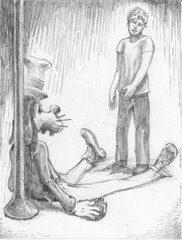Excerpt from my latest
novel, The Last Opus of Hector Berlioz, 2016, more timely by
the day: the scene is chapter 17, Peace Camp.
“Let us stand with hands
over hearts and not say the Pledge of Allegiance. Instead I want
you kids to think how amazing life really is on our planet and how
great that we get to live it. Think about how fun it is that
tomorrow comes and the day after and the day after. And how we get
one chance to experience it and what an outrageous opportunity that
is.”
Ronnie Vogel belched.
Hector Berlioz cringed, then told the tittering campers to calm back
down.
“Have you heard about
the nuclear bombing of Japan to end world War 2?” he asked thirty
indifferent peace campers sitting cross legged and sprawling on the
grass.
All nodded their heads
hypnotically. Ronnie said, “The Japs had it comin'.”
“They did not,”
Doreen Rampi retorted.
“This is what Admiral
Leahy, chief of staff to President Truman said about it:
"'It is my opinion that the use of this
barbarous weapon at Hiroshima and Nagasaki was of no material
assistance in our war against Japan. The Japanese were already
defeated and ready to surrender because of the effective sea blockade
and the successful bombing with conventional weapons. In being the
first to use it, we had adopted an ethical standard common to the
barbarians of the Dark Ages.'
“Were the barbarians of the Dark Ages Good Guys?”
Most of the campers shook their heads. “That's why we call it the Dark Ages, isn't it? It's something we are told we have emerged from into the light of humanity, so we can see our advancement.”
They nodded automatically.
“Well then, how could this guy be right? We're the good guys. The ones everybody is always glad to see.”
“I'll bet he was a spy,” Ronnie asserted.
“Even so, what if,” Berlioz posed, “the residents of Hiroshima had known what was coming and they were able to call the pilot of the Enola Gay over the radio?”
A few campers returned to giggling. “What's that?” Ronnie blurted. “A queer lizard?”
“He didn't say a gay anole,” Doreen chided.”
“Well then, what...”
“It's the plane that flew over a Japanese city called Hiroshima into which the people in the plane dropped an atom bomb. You ever been next to a tiny firecracker when it goes off? Imagine being next to an atom bomb. Soon city officials would be rescued from boring issues like a storm drain blockage or a down telephone line.”
“Cool,” Ronnie said.
Hector tried not to hate Ronnie, maybe his parents just a little. “Don't you think they were entitled to a telephone call? A chance to argue for not being arbitrarily disintegrated?”
Being children, they recognized sense in what Berlioz was saying and to their surprise, became interested.
“Heck, in this country we get to contest a twenty dollar parking ticket. Suppose Hiroshima residents were lined up, each with a minute to talk to the pilot on a phone that could translate their words into English. Women telling about the stupid but lovable things their husbands do, men speaking proudly, hopefully of their children, children telling what they plan to do when they grow up, grandparents speaking of their legacy. Suppose this went on and on as the plane flew thirteen hours toward its target. What would the pilot say to them? That they were wrong? That the bomb he carried was for a military target and they could go on with their lives? What if they convinced him of how bad it would be? Would he try to tell each caller why it was alright that he would end their lives soon, take away their trip to the country, their next family vacation parents had worked toward all year, render obsolete the good grades students had worked hard to achieve, make a joke of Mom's recent visit to the grocery, blow to Kingdom Come all their emotions; and it wasn't really his fault because his country had told him to do it and he had pledged allegiance to that country all his life so he had no choice? That his allegiance to his country had entitled him to kill them and stop all their hopes and dreams, all their love for life and one another? What if one of the callers said, 'but your country doesn't tell you to do this. Only your government does. Have you pledged allegiance to the government? You do this not because you are forced to but because you agreed to. When you stand before God he may ask you who told you you could drop that bomb and what a poor excuse will be your government then.'
“And then the line went dead. Suppose the pilot got thinking about that last call and ...to be continued

No comments:
Post a Comment